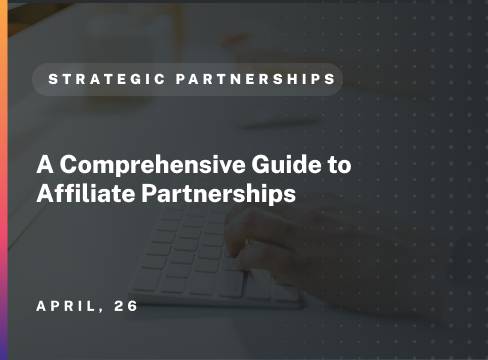Affiliate partnerships have revolutionized modern business practices, opening new avenues for growth, outreach, and innovation. These strategic alliances enable companies to leverage each other’s strengths and compensate for weaknesses, creating a powerful collaborative force.
In this post, we’ll explore the exciting world of affiliate partnerships and how they can help businesses of all sizes achieve their goals.
What is an Affiliate Partner?
In the partnership space, the role of an affiliated partner is crucial. These partners leverage the vast digital landscape to offer strategic advantages to both parties. This model enables organizations to connect with an affiliated partner’s established online presence and credibility, providing a platform for these partners to monetize their expertise without direct sales or inventory.
Affiliated partners, from industry experts to content platforms, enhance the ecosystem with diverse promotional channels. Success hinges on aligning values and interests, ensuring that the right affiliated partners are chosen to drive genuine engagement and achieve meaningful outcomes.
Who Can Become an Affiliated Partner?
The scope of affiliate partnerships extends to professionals and organizations that can strategically leverage their networks, expertise, and platforms to drive mutual growth and value.
Here’s a closer look at who can become an influential affiliate partner in the partnership space:
1. Strategic Business Consultants
Business consultants focusing on strategic development and growth are prime candidates for becoming affiliate partners. Their deep understanding of market dynamics and extensive networks position them perfectly to recommend solutions, tools, and services that can drive business efficiency and growth.
As affiliated partners, they can offer endorsements that are not only credible but also highly targeted to their client’s needs, thereby adding significant value to both the businesses they consult for and their affiliate partners.
2. B2B Service Providers
Companies that offer B2B services, such as marketing agencies, software developers, and cloud service providers, stand to gain substantially from entering into affiliate partnerships. These providers can enhance their value proposition by integrating complementary services or products.
3. Industry Associations and Networking Groups
Organizations that bring together professionals from specific industries, such as trade associations and professional networking groups, are uniquely positioned to act as affiliate partners. By partnering with companies offering relevant products or services to their members, these groups can provide valuable resources and benefits, strengthening their membership value proposition.
4. Event Organizers and Conference Hosts
Event organizers and hosts of conferences and professional gatherings have a captive audience already engaged and interested in specific topics or industries. This makes them ideal affiliated partners for businesses looking to promote their products or services to a targeted demographic.
By incorporating affiliate partnerships into their events, whether through sponsored sessions, product showcases, or exclusive offers for attendees, event organizers can add value to the participant experience while benefiting from additional revenue streams.
5. Educational and Training Institutions
Educational institutions and organizations that provide professional training and development programs can become powerful affiliate partners by integrating relevant products and services into their curricula.
This approach enhances the learning experience by giving students access to practical tools and resources and opens up new funding avenues for educational providers.
A partnership between a project management training provider and a software company offering project management tools exemplifies how such affiliations can be mutually beneficial.
Understanding Affiliate Relationships
Affiliate relationships are a cornerstone of performance-based marketing strategies that hinge on mutual success. These relationships are formalized through affiliate agreements, which detail the scope of engagement, compensation structures, and performance-tracking methodologies.
An affiliated partner plays a pivotal role in this context, acting as a promoter and strategic ally aligned with the brand’s objectives and values.
Critical Characteristics of Affiliate Relationships in the Partnership Space
1. Strategic Alignment and Trust
The foundation of a successful affiliate relationship lies in strategic alignment and the cultivation of trust between the affiliated partner and the business. Transparency is critical, with both parties openly communicating their expectations, strategies, and outcomes. In the partnership leaders’ realm, an affiliate becomes more than a promoter—they embody the brand’s values and mission in engaging with potential clients or customers.
2. Performance-Driven Results
The success of an affiliate relationship is quantifiably measured by the impact of the affiliated partner’s efforts—be it through engagement metrics, lead generation, or direct sales. This performance orientation ensures that affiliates are motivated to employ their best strategies and resources, aligning their initiatives with the brand’s targets. A performance-driven approach not only incentivizes affiliates but also provides a clear metric for evaluating the partnership’s success and areas for improvement.
3. Reciprocal Value Creation
The principle of mutual benefit is central to affiliate relationships in the partnership leaders’ arena. It encompasses increased brand visibility, market expansion, and the tapping of unexplored segments. For the affiliated partner, the benefits extend beyond commissions to include enhanced reputation, access to broader networks, and the opportunity to affiliate with brands that resonate with their audience or business model.
4. Long-term Strategic Partnerships
Unlike traditional affiliate relationships that might focus solely on short-term gains, the partnership space emphasizes long-term collaborations. These enduring strategic partnerships are built on a shared vision for growth and are sustained by continuous optimization and adaptation to market dynamics.
Building a Fruitful Affiliate Partnership
To build a relationship that’s both enduring and profitable, consider the following steps:
Choose the Right Partners
Alignment between the affiliate’s audience and the business’s target market is crucial. Promoting products or services should offer genuine value to the affiliate’s followers.
Clear Communication
Establish clear communication channels and expectations from the outset. Both parties should understand the partnership terms, compensation models, and how performance will be tracked.
Provide Resources
Businesses should equip their affiliates with the tools and resources to succeed, such as promotional materials, product samples, and detailed product information.
Monitor and Optimize
Regularly review the performance of affiliate campaigns and be open to adjusting strategies for better alignment and improved results.
Conclusion
When affiliated partners, encompassing industry experts, thought leaders, and specialized content creators, align with businesses, their professional stands are elevated, and the brand’s online vision is significantly amplified. The shift towards authentic, performance-based marketing strategies underscores the value of these collaborative models.
Join The 1700+ Leaders Transforming Partnerships
As a member of Partnership Leaders you will:
- Build and learn with the top partner people at the best companies around the world.
- Increase your impact and accelerate your career with proven resources, tools, and best practices.
- Grow a network of peers, partners, and advisors with common objectives.



